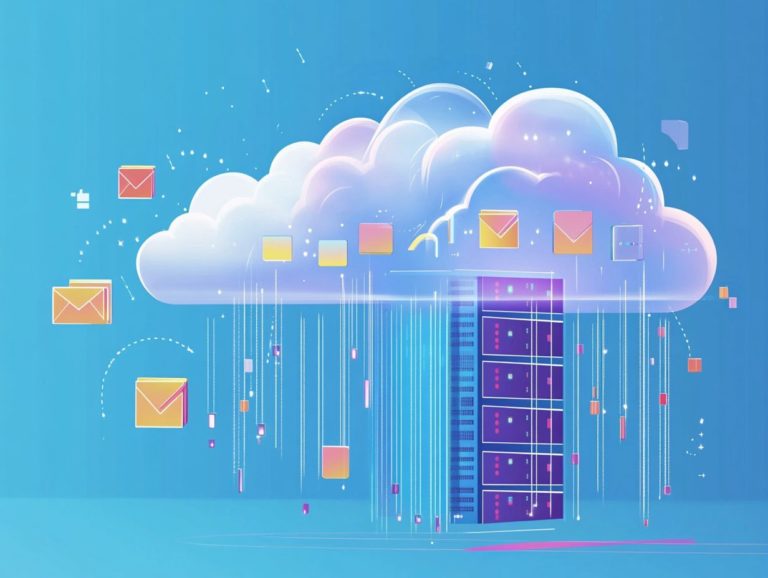How to Choose a Cloud Backup Solution?
In today’s increasingly digital landscape, safeguarding your data is more critical than ever. Cloud backup solutions present a dependable method for protecting your important files, whether for personal use or ensuring business continuity.
This article delves into what cloud backup entails, the benefits it offers, and key factors to consider when choosing the right solution. You’ll also discover the various types available and gain insights into best practices for effective implementation.
Dive into the essentials of cloud backup and secure your valuable information!
Contents
Key Takeaways:
- Choose a cloud backup solution that meets your storage needs and budget. Consider factors like storage capacity, pricing, and compatibility with your systems.
- Prioritize security and data encryption when selecting a cloud backup solution. Look for options that offer strong encryption methods to protect your sensitive information.
- Consider the type of cloud backup solution that best fits your needs, whether it’s public, private, or hybrid. Each has its advantages and disadvantages, so choose wisely.
Understanding Cloud Backup Solutions
Understanding cloud backup solutions is crucial, whether you re an individual or a business aiming for dependable data protection. These services enable secure data transfer and storage.
Cloud storage solutions meet diverse needs from on-premises backup to requirements of cloud customers allowing for efficient data management and retention.
This rich exploration will dive into the complexities of cloud backup solutions and the numerous benefits they offer.
What is Cloud Backup?
Cloud backup is the process of storing your data on remote servers within a cloud computing environment, rather than relying on local on-premises backup solutions. This approach harnesses the power of backup service providers, offering scalable storage solutions accessible via the internet.
You would typically use software-defined storage systems that automate data management tasks, ensuring seamless access and protection for your valuable information.
The technology behind cloud backup focuses on redundancy and encryption, enhancing your data’s security while effectively reducing the risks of loss.
By adopting cloud backup, you gain automatic updates and off-site data storage, significantly reducing your exposure to local disasters.
This strategy improves your data protection and saves you money, setting it apart from traditional backup methods that often rely on labor-intensive manual processes and physical storage devices.
Benefits of Using a Cloud Backup Solution
A cloud backup solution offers many advantages for individuals and businesses, cultivating a more secure and efficient approach to data management.
Leveraging these services significantly enhances your data protection and recovery capabilities, fortifying a robust disaster recovery plan that ensures seamless business continuity.
The ease of implementing data retention policies bolsters compliance with regulations like GDPR, granting you peace of mind in an increasingly perilous cybersecurity landscape.
Advantages for Individuals and Businesses
The advantages of cloud backup extend to you, whether you’re an individual or part of a business, offering unique benefits designed to meet diverse needs.
As an individual, you’ll appreciate the ease of use that cloud backup solutions like Google Drive and Dropbox provide. With Google Drive, you can drag and drop files easily, storing and accessing important documents from anywhere with an internet connection, all while enjoying the peace of mind that comes with encryption and regular updates protecting your personal data.
For businesses, cloud backup offers scalable solutions that evolve with your operations. Automated backup services such as Acronis and Backblaze ensure that critical data is consistently preserved, allowing you to meet compliance requirements for recovery point objectives.
Imagine a small company using cloud backup; they could effortlessly restore customer information after an unexpected server failure, highlighting the reliability and efficiency of these systems in real-world situations.
Don’t wait! Protect your data now to avoid catastrophic losses.
Factors to Consider when Choosing a Cloud Backup Solution
When you’re selecting a cloud backup solution, several crucial factors come into play. These factors can influence both the effectiveness and suitability of the service for your unique needs, and knowing how to choose the right cloud storage solution is essential.
Key considerations include:
- Storage capacity
- Pricing models
- Security features like data encryption
- Compatibility with your existing systems
- User-friendliness
With a multitude of options at your fingertips, systematically evaluating these factors will help ensure you choose a solution that aligns perfectly with your backup requirements and business objectives. For guidance, refer to how to choose a cloud service provider.
Storage Capacity and Pricing
When evaluating cloud backup solutions, consider storage capacity and pricing models. Additionally, understanding how to choose a cloud security provider is crucial, as these factors directly influence your backup strategy and overall costs.
Different providers present a spectrum of storage options tailored to meet diverse user needs. Plans range from modest personal options for individuals to comprehensive enterprise solutions designed for large organizations.
Incremental backups, which save only the changes since the last backup, play a crucial role. They optimize storage efficiency and minimize unnecessary data transfer.
Various pricing models, such as subscription-based, pay-as-you-go, or tiered pricing, significantly impact the cost of backup services.
By comparing these factors, you can discover a balanced solution that aligns with your specific requirements. This maximizes both costs and benefits, whether you’re a casual user or managing extensive data storage for a business.
Security and Data Encryption
Security and data encryption should be at the forefront of your mind when considering a cloud backup solution. This is especially important in an era rife with cybersecurity threats.
In today s digital landscape, prioritizing the protection of your sensitive information against unauthorized access and potential breaches is crucial. Embracing strong encryption methods, such as AES-256, which is a way to secure data, is vital for safeguarding your data, whether it s at rest or in transit.
Choosing services that offer end-to-end encryption ensures that only authorized individuals can access your data. This delivers invaluable peace of mind.
Additionally, secure data transfer practices, such as using TLS (Transport Layer Security), further enhance your protection.
When assessing different cloud backup services, seek out providers that clearly communicate their security measures. This includes encryption protocols and compliance with industry standards. Transparency is essential for ensuring your data remains secure and confidential.
Compatibility and User-Friendliness
Compatibility with your existing systems and user-friendliness are crucial factors that shape your experience with a cloud backup solution.
Choosing the right backup software that effortlessly integrates with your current infrastructure think platforms like AWS or Azure can significantly enhance efficiency and effectiveness.
This seamless integration ensures that your data flows smoothly, minimizing disruptions while maximizing performance.
An intuitive interface allows even those without technical expertise to navigate the software with ease. This simplifies backup management and makes data retrieval a breeze when you need it.
These factors are key to a successful backup experience. They directly impact your organization’s ability to safeguard its information assets without the added burden of unnecessary complexity.
Types of Cloud Backup Solutions
Understanding the various types of cloud backup solutions is essential for choosing a hybrid cloud solution that perfectly aligns with your unique data protection needs.
The primary classifications public cloud, private cloud, and hybrid cloud each present distinct advantages and considerations in terms of scalability, cost, and security.
Public cloud solutions offer easily accessible storage without heavy upfront investments, making them a convenient choice. Conversely, private clouds provide more controlled environments that cater specifically to compliance requirements.
Meanwhile, hybrid clouds combine the best of both worlds, enabling you to optimize your data management strategies effectively.
Assess your current solutions and make a choice that best suits your needs!
Public, Private, and Hybrid Cloud
Public, private, and hybrid clouds form the trio of primary cloud backup solutions, each boasting unique characteristics tailored for specific use cases.
Public clouds, such as those from Amazon Web Services and Google Cloud, offer cost-effective options for scalable storage without the burden of significant infrastructure investment.
Private clouds provide enhanced security and customization, making them particularly attractive for organizations that handle sensitive data or must comply with strict regulatory standards.
Hybrid solutions take the best of both worlds, allowing the secure storage of sensitive information in a private cloud while leveraging the scalability of public cloud services for less critical data.
By assessing your specific data protection needs considering factors like data sensitivity, regulatory requirements, and budget constraints you can make an informed choice that aligns with your organizational goals.
Best Practices for Implementing a Cloud Backup Solution
Implementing a cloud backup solution effectively involves adhering to best practices that ensure your data remains secure, recoverable, and compliant with retention rules.
Establishing a regular backup frequency is vital for maintaining data integrity. A well-defined disaster recovery plan guarantees that you can swiftly restore critical information in the event of data loss.
Enforcing strict data retention policies helps you meet compliance standards and protects sensitive information from potential breaches.
Backup Frequency and Disaster Recovery Plan
Establecer una frecuencia de respaldo adecuada y un plan integral de recuperaci n ante desastres son componentes esenciales de una estrategia robusta de respaldo en la nube.
Debe evaluar sus demandas operativas nicas y obligaciones regulatorias para determinar el horario de respaldo ideal, teniendo en cuenta factores como la volatilidad de los datos, la actividad de los usuarios y el cumplimiento legal.
Esta consideraci n es crucial, ya que asegura que pueda recuperar sus datos cr ticos de manera efectiva y eficiente cuando sea necesario.
Un plan de recuperaci n ante desastres bien documentado debe alinearse con su objetivo de punto de recuperaci n establecido, guiando cu n r pido puede restaurar datos en caso de una interrupci n.
Haciendo esto, puede minimizar el tiempo de inactividad y mantener la continuidad del negocio, asegurando que la informaci n vital est f cilmente accesible cuando m s la necesite.
Frequently Asked Questions
What is a cloud backup solution and why is it important to choose the right one?
A cloud backup solution is a service that allows you to store and protect your digital data in an off-site, secure server. It’s important to choose the right one to ensure the safety and accessibility of your data in case of unexpected events.
How do I determine the storage capacity I need for a cloud backup solution?
The storage capacity you need depends on the amount and type of data you have. Consider the size of your files, how often they are updated, and how long you need to keep them when choosing a storage plan.
What security features should I look for in a cloud backup solution?
Look for features such as end-to-end encryption, multi-factor authentication, and regular data audits. These security measures will ensure the protection of your data from cyber threats.
Is it important to consider the speed and reliability of a cloud backup solution?
Yes, considering the speed and reliability of a cloud backup solution is essential. This will ensure that your data is backed up and restored efficiently, and that you have access to it whenever needed.
Should I choose a cloud backup solution from a well-known provider or a smaller company?
Both options have their advantages. A well-known provider may offer more features and a larger storage capacity, while a smaller company may provide more personalized support and a lower cost. Consider your needs and do some research before making a decision.
What are the cost factors to consider when choosing a cloud backup solution?
The cost will depend on factors such as storage capacity, features, and support. It’s important to compare the costs of different providers and choose one that offers the best value for your specific needs.





